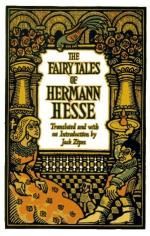|
This section contains 944 words (approx. 4 pages at 300 words per page) |

|
[In] spite of his 1946 Nobel Prize [Hesse's] work is somehow not admitted into the canon of "great" twentieth-century German authors. Germans, at least, would be amused nowadays, or mildly astonished, if a foreigner were to mention him along with Thomas Mann, Hofmannsthal, Rilke, Kafka, or Brecht….
It is partly because the canon has no place for a writer whose work, though a coherent whole, is so curiously mixed. It is sometimes cloying, sometimes profound, then quixotically un-ironic, then at once brisk, mysterious, and topical, and at other times, if not in his last two fictions, what Germans patronizingly call pubertär—and most of this in a prose that has a mercurial texture all its own….
[The years Hesse spent with his first wife at Gaienfofen, on Lake Constance, shaped him] as a mildly disturbed but polite 
|
This section contains 944 words (approx. 4 pages at 300 words per page) |

|


